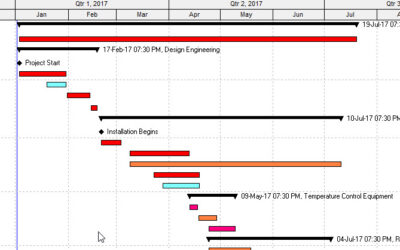Optimum Scheduling: Thinking Outside Of the Construction Schedule
In the summer of 2008, I took a job as a project controls manager for a mega project in the Arabian/Persian Gulf. When looking at the CPM (Critical Path Method) schedule for the project, I saw huge excavation activities scheduled during that summer. Immediately, I thought of productivities under burning heat with temperature reaching and exceeding 50? Celsius (122 Fahrenheit). My first reaction was: Who prepared that schedule (and estimated activities’ durations)? Did he take in consideration all the impacting factors? I wasn’t surprised much when I found out that these durations were based on productivities taken from other projects; somewhere else and in different environments. Expected durations, according to my estimates, were a lot more; perhaps even double the amount.
Such a miscalculation can complicate things in the management of the construction of that project. The activities will likely finish late, which puts pressure on the contractor to do extra effort to catch up. Most likely, the contractor has to increase the number of crews, work overtime, and take other measures to expedite work; which will increase the cost and may not even allow for the full recovery of the time missed in the underestimating of the durations.
The accuracy of the duration estimates for the activities and taking in consideration all the impacting factors is extremely important. However, another important point occurred to me. Even with an accurate estimate, the harsh weather conditions will result in a higher unit price:
Unit Price ($/CY)=(Crew Daily Cost ($))/(Crew Daily Production (CY))
As we assume the amount in the numerator (crew daily cost) is constant, the amount in the denominator (crew daily production) decreases with the harsh / adverse conditions, so the unit price increases. Let’s not forget that extreme weather may have a negative impact not only on workers but also on equipment and machinery. This impact either causes more fatigue / damage to the equipment and/or requires more maintenance and precautionary measures, which is all additional cost. Also, cost may increase either as a result of expediting work to make up for lost productivity, or from additional indirect (overhead) cost if project is not expedited.
Optimum Scheduling Example
Let’s imagine the activity we just discussed is now shifted to another time of the year, when weather is moderate or favorable. Productivity will be higher and hence the unit price will be lower. But who can make that decision to delay the start of the activity, and what’s the impact of such decision on the project’s completion date? A major problem I constantly see is that owners make uninformed decisions simply because the contractor (or PM) did not explain the technical matter clearly to them, giving them different options along with the cost / consequences of each option.
Let’s assume we have a situation of excavation in an extremely hot summer. Assume that the duration under normal / favorable conditions = 20 days. The contractor calculated these options:
- Starting as originally planned, 15 July: The duration will be 40 days and the unit cost is $10/M3
- Starting on 15 September (2 months late): The duration will be 32 days and the unit cost is $8/M3
- Starting on 15 October (3 months late): The duration will be 24 days and the unit cost is $6/M3
- Starting on 15 November (4 months late): The duration will be 20 days and the unit cost is $5/M3
But the real time impact will be less than 2, 3, or 4 months as shown in the delay of start in the above scenarios. First, there will be time saving because of the shorter duration. Second, this shift of the start of the project, will also impact subsequent activities; pushing them to more favorable time which will likely result in shorter durations. This induces a positive domino effect on at least the first part of the schedule that was supposed to be performed in the severe weather.
There are potential problems though:
- What if the time saved by shorter durations did not offset the delay in the project start, i.e. project finish date slipped?
- What if some activities scheduled to be performed towards the end of the project, slipped to less favorable time (say from April to June)?
These two points underscore the importance of proper planning by the contractor, and then proper project control while execution. The best scenario for the contractor is to fit that entire project in the favorable time, even if he has to accelerate the schedule. Thus, he will get highest productivities (least unit cost) and save on overhead, as overhead is proportional to the entire project duration. He may even qualify for early finish bonus.
Keep in mind that the consequence of case 1 above (late finish) may not necessarily pose a problem. In some projects, cost is a higher importance factor than time. So, if the owner is given the choices of:
- Start as originally planned and finish on time, with cost of $35 million, or
- Start 3 months later and finish one month late, with cost of $33 million
The contractor has to study different scenarios to his cost-loaded schedule; along with finish date and total cost for each scenario . The contractor can then discuss these options with the owner, allowing him to make the decision that is in his/her best interest. This may sound logical and trivial, but in my practical experience, it is rarely done properly as it should be. The owner is the client, who is paying the bill, so he/she is entitled to know the different options available along with their consequences. Also keep in mind that the best solution for one project may not be best for another one. We make decisions based on the project’s objective, requirements and constraints.
Source
See Multi-objective optimization model for scheduling of construction projects under extreme weather by Ahmed Senouci and Saleh Mubarak. A research paper on using genetic algorithms to optimize certain schedule criterion (cost / time). Download here.





